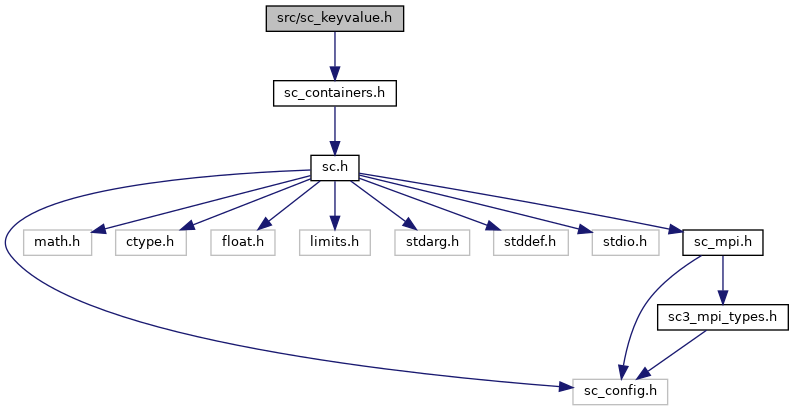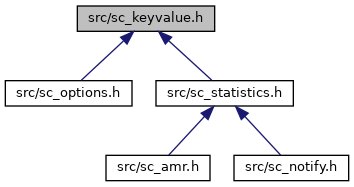This file provides a lookup structure for key-value pairs. More...
#include <sc_containers.h>

Go to the source code of this file.
Typedefs | |
| typedef struct sc_keyvalue | sc_keyvalue_t |
| The key-value container is an opaque structure. | |
| typedef int(* | sc_keyvalue_foreach_t) (const char *key, const sc_keyvalue_entry_type_t type, void *entry, const void *u) |
| Function to call on every key value pair. More... | |
Enumerations | |
| enum | sc_keyvalue_entry_type_t { SC_KEYVALUE_ENTRY_NONE = 0 , SC_KEYVALUE_ENTRY_INT , SC_KEYVALUE_ENTRY_DOUBLE , SC_KEYVALUE_ENTRY_STRING , SC_KEYVALUE_ENTRY_POINTER } |
| The values can have different types. More... | |
Functions | |
| sc_keyvalue_t * | sc_keyvalue_new () |
| Create a new key-value container. More... | |
| sc_keyvalue_t * | sc_keyvalue_newf (int dummy,...) |
| Create a container and set one or more key-value pairs. More... | |
| sc_keyvalue_t * | sc_keyvalue_newv (va_list ap) |
| Create a container and set one or more key-value pairs. More... | |
| void | sc_keyvalue_destroy (sc_keyvalue_t *kv) |
| Free a key-value container and all internal memory for key storage. More... | |
| sc_keyvalue_entry_type_t | sc_keyvalue_exists (sc_keyvalue_t *kv, const char *key) |
| Routine to check existence of an entry. More... | |
| sc_keyvalue_entry_type_t | sc_keyvalue_unset (sc_keyvalue_t *kv, const char *key) |
| Routine to remove an entry. More... | |
| int | sc_keyvalue_get_int (sc_keyvalue_t *kv, const char *key, int dvalue) |
| Routines to retrieve an integer value by its key. More... | |
| double | sc_keyvalue_get_double (sc_keyvalue_t *kv, const char *key, double dvalue) |
| Retrieve a double value by its key. More... | |
| const char * | sc_keyvalue_get_string (sc_keyvalue_t *kv, const char *key, const char *dvalue) |
| Retrieve a string value by its key. More... | |
| void * | sc_keyvalue_get_pointer (sc_keyvalue_t *kv, const char *key, void *dvalue) |
| Retrieve a pointer value by its key. More... | |
| int | sc_keyvalue_get_int_check (sc_keyvalue_t *kv, const char *key, int *status) |
| Query an integer key with error checking. More... | |
| void | sc_keyvalue_set_int (sc_keyvalue_t *kv, const char *key, int newvalue) |
| Routine to set an integer value for a given key. More... | |
| void | sc_keyvalue_set_double (sc_keyvalue_t *kv, const char *key, double newvalue) |
| Routine to set a double value for a given key. More... | |
| void | sc_keyvalue_set_string (sc_keyvalue_t *kv, const char *key, const char *newvalue) |
| Routine to set a string value for a given key. More... | |
| void | sc_keyvalue_set_pointer (sc_keyvalue_t *kv, const char *key, void *newvalue) |
| Routine to set a pointer value for a given key. More... | |
| void | sc_keyvalue_foreach (sc_keyvalue_t *kv, sc_keyvalue_foreach_t fn, void *user_data) |
| Iterate through all stored key-value pairs. More... | |
Detailed Description
This file provides a lookup structure for key-value pairs.
Typedef Documentation
◆ sc_keyvalue_foreach_t
| typedef int(* sc_keyvalue_foreach_t) (const char *key, const sc_keyvalue_entry_type_t type, void *entry, const void *u) |
Function to call on every key value pair.
- Parameters
-
[in] key The key for this pair [in] type The type of entry [in] entry Pointer to the entry [in] u Arbitrary user data.
- Returns
- Return true if the traversal should continue, false to stop.
Enumeration Type Documentation
◆ sc_keyvalue_entry_type_t
The values can have different types.
Function Documentation
◆ sc_keyvalue_destroy()
| void sc_keyvalue_destroy | ( | sc_keyvalue_t * | kv | ) |
Free a key-value container and all internal memory for key storage.
- Parameters
-
[in,out] kv The key-value container is invalidated by this call.
- Examples
- options.c.
◆ sc_keyvalue_exists()
| sc_keyvalue_entry_type_t sc_keyvalue_exists | ( | sc_keyvalue_t * | kv, |
| const char * | key | ||
| ) |
Routine to check existence of an entry.
- Parameters
-
[in] kv Valid key-value container. [in] key Lookup key to query.
- Returns
- The entry's type if found and SC_KEYVALUE_ENTRY_NONE otherwise.
◆ sc_keyvalue_foreach()
| void sc_keyvalue_foreach | ( | sc_keyvalue_t * | kv, |
| sc_keyvalue_foreach_t | fn, | ||
| void * | user_data | ||
| ) |
Iterate through all stored key-value pairs.
- Parameters
-
[in] kv Valid key-value container. [in] fn Function to call on each key-value pair. [in,out] user_data This pointer is passed through to fn.
◆ sc_keyvalue_get_double()
| double sc_keyvalue_get_double | ( | sc_keyvalue_t * | kv, |
| const char * | key, | ||
| double | dvalue | ||
| ) |
Retrieve a double value by its key.
This function asserts that the key, if existing, points to the correct type.
- Parameters
-
[in] kv Valid key-value container. [in] key Lookup key, may or may not exist. [in] dvalue Default value returned if key is not found.
- Returns
- If key is not present then dvalue is returned, otherwise the value stored under key.
◆ sc_keyvalue_get_int()
| int sc_keyvalue_get_int | ( | sc_keyvalue_t * | kv, |
| const char * | key, | ||
| int | dvalue | ||
| ) |
Routines to retrieve an integer value by its key.
This function asserts that the key, if existing, points to the correct type.
- Parameters
-
[in] kv Valid key-value container. [in] key Lookup key, may or may not exist. [in] dvalue Default value returned if key is not found.
- Returns
- If key is not present then dvalue is returned, otherwise the value stored under key.
◆ sc_keyvalue_get_int_check()
| int sc_keyvalue_get_int_check | ( | sc_keyvalue_t * | kv, |
| const char * | key, | ||
| int * | status | ||
| ) |
Query an integer key with error checking.
We check whether the key is not found or it is of the wrong type. A default value to be returned on error can be passed in as *status. If status is NULL, then the result on error is undefined.
- Parameters
-
[in] kv Valid key-value table. [in] key Non-NULL key string. [in,out] status If not NULL, set to 0 if there is no error, 1 if the key is not found, 2 if a value is found but its type is not integer, and return the input value *status on error.
- Returns
- On error we return *status if status is not NULL, and else an undefined value backed by an assertion. Without error, return the result of the lookup.
◆ sc_keyvalue_get_pointer()
| void* sc_keyvalue_get_pointer | ( | sc_keyvalue_t * | kv, |
| const char * | key, | ||
| void * | dvalue | ||
| ) |
Retrieve a pointer value by its key.
This function asserts that the key, if existing, points to the correct type.
- Parameters
-
[in] kv Valid key-value container. [in] key Lookup key, may or may not exist. [in] dvalue Default value returned if key is not found.
- Returns
- If key is not present then dvalue is returned, otherwise the value stored under key.
◆ sc_keyvalue_get_string()
| const char* sc_keyvalue_get_string | ( | sc_keyvalue_t * | kv, |
| const char * | key, | ||
| const char * | dvalue | ||
| ) |
Retrieve a string value by its key.
This function asserts that the key, if existing, points to the correct type.
- Parameters
-
[in] kv Valid key-value container. [in] key Lookup key, may or may not exist. [in] dvalue Default value returned if key is not found.
- Returns
- If key is not present then dvalue is returned, otherwise the value stored under key.
◆ sc_keyvalue_new()
| sc_keyvalue_t* sc_keyvalue_new | ( | ) |
◆ sc_keyvalue_newf()
| sc_keyvalue_t* sc_keyvalue_newf | ( | int | dummy, |
| ... | |||
| ) |
Create a container and set one or more key-value pairs.
Arguments come in pairs of 2: a static string "type:key" and a value. The type is the letter i, g, s, p for int, double, const char *, and void *, respectively.
- Parameters
-
[in] dummy Not touched, just to use the varargs feature.
- Returns
- A key-value container initialized with the given entries.
◆ sc_keyvalue_newv()
| sc_keyvalue_t* sc_keyvalue_newv | ( | va_list | ap | ) |
Create a container and set one or more key-value pairs.
This function works analogously to sc_keyvalue_newf. Arguments come in pairs of 2: a static string "type:key" and a value. The type is the letter i, g, s, p for int, double, const char *, and void *, respectively.
- Parameters
-
[in] ap Varargs pointer; see stdarg.h for the syntax.
- Returns
- A key-value container initialized with the given entries.
◆ sc_keyvalue_set_double()
| void sc_keyvalue_set_double | ( | sc_keyvalue_t * | kv, |
| const char * | key, | ||
| double | newvalue | ||
| ) |
Routine to set a double value for a given key.
- Parameters
-
[in] kv Valid key-value table. [in] key Non-NULL key to insert or replace. If it already exists, it must be of type double. [in] newvalue New value will be stored under key.
◆ sc_keyvalue_set_int()
| void sc_keyvalue_set_int | ( | sc_keyvalue_t * | kv, |
| const char * | key, | ||
| int | newvalue | ||
| ) |
Routine to set an integer value for a given key.
- Parameters
-
[in] kv Valid key-value table. [in] key Non-NULL key to insert or replace. If it already exists, it must be of type integer. [in] newvalue New value will be stored under key.
- Examples
- options.c.
◆ sc_keyvalue_set_pointer()
| void sc_keyvalue_set_pointer | ( | sc_keyvalue_t * | kv, |
| const char * | key, | ||
| void * | newvalue | ||
| ) |
Routine to set a pointer value for a given key.
- Parameters
-
[in] kv Valid key-value table. [in] key Non-NULL key to insert or replace. If it already exists, it must be of type pointer. [in] newvalue New value will be stored under key.
◆ sc_keyvalue_set_string()
| void sc_keyvalue_set_string | ( | sc_keyvalue_t * | kv, |
| const char * | key, | ||
| const char * | newvalue | ||
| ) |
Routine to set a string value for a given key.
- Parameters
-
[in] kv Valid key-value table. [in] key Non-NULL key to insert or replace. If it already exists, it must be of type string. [in] newvalue New value will be stored under key.
◆ sc_keyvalue_unset()
| sc_keyvalue_entry_type_t sc_keyvalue_unset | ( | sc_keyvalue_t * | kv, |
| const char * | key | ||
| ) |
Routine to remove an entry.
- Parameters
-
[in] kv Valid key-value container. [in] key Lookup key to remove if it exists.
- Returns
- The entry's type if found and removed, SC_KEYVALUE_ENTRY_NONE otherwise.